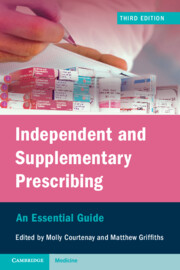Book contents
- Frontmatter
- Contents
- List of Contributors
- Foreword
- Preface
- 1 Non-Medical Prescribing: An Overview
- 2 Non-Medical Prescribing in a Multidisciplinary Team Context
- 3 Consultation Skills and Decision Making
- 4 Legal Aspects of Independent and Supplementary Prescribing
- 5 Ethical Issues in Independent and Supplementary Prescribing
- 6 Psychology and Sociology of Prescribing
- 7 Applied Pharmacology
- 8 Monitoring Skills
- 9 Promoting Concordance in Prescribing Interactions
- 10 Evidence-Based Prescribing
- 11 Extended/Supplementary Prescribing: A Public Health Perspective
- 12 Calculation Skills
- 13 Prescribing in Practice: How It Works
- 14 Minimising the Risk of Prescribing Error
- 15 Education and Training to Become a Prescriber
- 16 Antimicrobial Prescribing
- Index
9 - Promoting Concordance in Prescribing Interactions
Published online by Cambridge University Press: 23 December 2021
- Frontmatter
- Contents
- List of Contributors
- Foreword
- Preface
- 1 Non-Medical Prescribing: An Overview
- 2 Non-Medical Prescribing in a Multidisciplinary Team Context
- 3 Consultation Skills and Decision Making
- 4 Legal Aspects of Independent and Supplementary Prescribing
- 5 Ethical Issues in Independent and Supplementary Prescribing
- 6 Psychology and Sociology of Prescribing
- 7 Applied Pharmacology
- 8 Monitoring Skills
- 9 Promoting Concordance in Prescribing Interactions
- 10 Evidence-Based Prescribing
- 11 Extended/Supplementary Prescribing: A Public Health Perspective
- 12 Calculation Skills
- 13 Prescribing in Practice: How It Works
- 14 Minimising the Risk of Prescribing Error
- 15 Education and Training to Become a Prescriber
- 16 Antimicrobial Prescribing
- Index
Summary
This chapter presents the meaning of concordance and examines the underpinning evidence base for effective prescribing consultations. Concordance is compared with the traditional approach of compliance in medicine taking, concluding that the evidence base for the latter has been shown to be inadequate in a number of respects. The chapter gives an overview of the evidence base for the concept of concordance and draws out the implications from research for the new generation of prescribers, outlining the reasons why practitioners who are independent (IPs) and/or supplementary prescribers (SPs) need to incorporate these principles into their practice. An overview of the skills and competencies that prescribing professionals need in order to adopt concordance in practice is then presented. This is followed by a review of research on healthcare professionals’ use of concordance in practice. The evidence to date suggest that healthcare professionals are not yet enacting this approach to medicines discussion in practice. Further research is required to both understand professional practice and develop interventions to move practice towards a partnership model of communication
Keywords
- Type
- Chapter
- Information
- Independent and Supplementary PrescribingAn Essential Guide, pp. 156 - 171Publisher: Cambridge University PressPrint publication year: 2022



